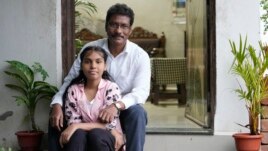01 January 2024
United States health officials recently approved two new gene treatments for sickle cell disease (SCD). The treatments provide hope that the disease might be curable. But experts say high costs and limited availability will prevent many people from receiving them.
SCD is a genetic disorder that causes oxygen-carrying red blood cells in the body to become misshapen. The condition can block blood flow and cause severe pain and organ damage.
SCD is more common among Black Americans, Africans and Middle Easterners than other population groups. Many children with the most severe form of the disease die before age five, usually from an infection or severe blood loss.

Gautam Dongre, of the National Alliance of Sickle Cell Organizations, sits for a portrait with his daughter, Sumedha, 13, at their residence in Nagpur, India, Wednesday, Dec. 6, 2023. (AP Photo/Ajit Solanki)
Worldwide, the disease is believed to affect millions. It is known to be common in places with high cases of malaria, like Africa and India. Scientific research has shown that people who have SCD seem to react less severely when they are infected with malaria.
While an estimated 1 million people suffer with the condition in India, many of them will not get the chance to receive the new gene treatments. The situation is not new to developing countries. Many have long faced limitations on medicines and other treatment methods for disease.
But the problem is even more severe with the new SCD treatments and other gene-based methods. This is mainly because of the high cost of treatment. The two methods approved in the U.S. – both of which are given as a single treatment – cost between $2.2 million and $3.1 million.
In addition, the treatment itself can be difficult to carry out in developing nations. This is because the process generally involves several steps and requires longer stays in well-equipped hospitals.
Vertex's treatment, called Casgevy, is designed to repair the genetic condition that causes misshapen cells in sickle cell sufferers. It uses a gene editing technology called CRISPR to do so. The other treatment, offered by a company called Bluebird Bio, does not use CRISPR technology. But it requires a similar treatment process as Vertex's version.
Dr. David Altshuler is the chief scientific officer at Vertex. He told The Associated Press that while there is clearly a "great unmet need" for the new SCD treatments, the process also presents "challenges."
Altshuler said Vertex is working to simplify the treatment process to make it be available to more people. For example, his team is seeking to develop a medication in pill form that could perform similarly to the gene editing method.
But experts have warned that simpler treatments will likely still be too costly for many people. This has led to calls for governments and non-profit organizations to get involved to help provide financial assistance to patients.
Gautam Dongre lives in the city of Nagpur in central India. His two children suffer from SCD. He told the AP he has been "praying the treatment should come to us."
Dongre's son is now 19 years old and his daughter is 13. They both currently take a drug called hydroxyurea. That drug has long been used to help prevent the formation of sickle-shaped red blood cells in an effort to control pain and other damaging effects.
Dongre leads India's National Alliance of Sickle Cell Organizations. He said many patients in rural parts of India are dying at very young ages without getting effective treatment.
He added that if the gene treatments for SCD one day make it to India, he would like his children to be among the first to get them.
But Dongre noted that people in all countries – rich or poor – should be able to get the latest treatments available. "We are all part of one single planet," he said.
I'm Bryan Lynn.
The Associated Press reported this story. Bryan Lynn adapted the report for VOA Learning English.
_____________________________________________
Words in This Story
gene editing – n. the process of changing genes using scientific methods in an effort to prevent or cure disease
challenge – n. something difficult that tests one's ability or determination